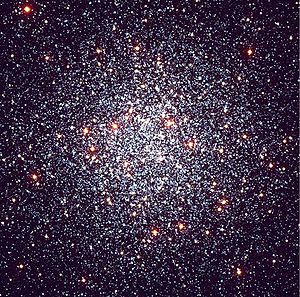Messier 55: Difference between revisions
No edit summary |
|||
| (One intermediate revision by the same user not shown) | |||
| Line 1: | Line 1: | ||
[[File:M55.jpg|thumb|Messier55, Summer Rose Star]] | |||
[[Messier 55]] (also known as M55 or NGC 6809 or "The Summer Rose Star") is a globular cluster in the constellation Sagittarius. It was discovered by Nicolas Louis de Lacaille in June 16, 1752 while observing from South Africa. M55 is at a distance of about 17,600 light-years away from Earth. It has a mass of about 269,000 times that of the Sun. As with other Milky Way globular clusters, it has a low abundance of elements other than hydrogen and helium compared to the Sun—what astronomers term the metallicity of the cluster. Only about 55 variable stars have been discovered in the central part of M55. <ref>[http://en.wikipedia.org/wiki/Messier_55 Messier55]</ref> | [[Messier 55]] (also known as M55 or NGC 6809 or "The Summer Rose Star") is a globular cluster in the constellation Sagittarius. It was discovered by Nicolas Louis de Lacaille in June 16, 1752 while observing from South Africa. M55 is at a distance of about 17,600 light-years away from Earth. It has a mass of about 269,000 times that of the Sun. As with other Milky Way globular clusters, it has a low abundance of elements other than hydrogen and helium compared to the Sun—what astronomers term the metallicity of the cluster. Only about 55 variable stars have been discovered in the central part of M55. <ref>[http://en.wikipedia.org/wiki/Messier_55 Messier55]</ref> | ||
| Line 8: | Line 10: | ||
<references/> | <references/> | ||
Found in HGS Manual on Page 108 | |||
[[Category: Ascension]] | [[Category: Ascension]] | ||
[[Category: HGS Manual]] | [[Category: HGS Manual]] | ||
Latest revision as of 21:17, 6 September 2014
Messier 55 (also known as M55 or NGC 6809 or "The Summer Rose Star") is a globular cluster in the constellation Sagittarius. It was discovered by Nicolas Louis de Lacaille in June 16, 1752 while observing from South Africa. M55 is at a distance of about 17,600 light-years away from Earth. It has a mass of about 269,000 times that of the Sun. As with other Milky Way globular clusters, it has a low abundance of elements other than hydrogen and helium compared to the Sun—what astronomers term the metallicity of the cluster. Only about 55 variable stars have been discovered in the central part of M55. [1]
PEG Build the Rod
This star cluster was brought into awareness as a source of Algorithm code transmission for off planet reversal networks that ping coordinate locations from the the Mother Arc Gateway in the 3D dimension, located in Seattle, Washington in Puget Sound.[2]
References
Found in HGS Manual on Page 108


